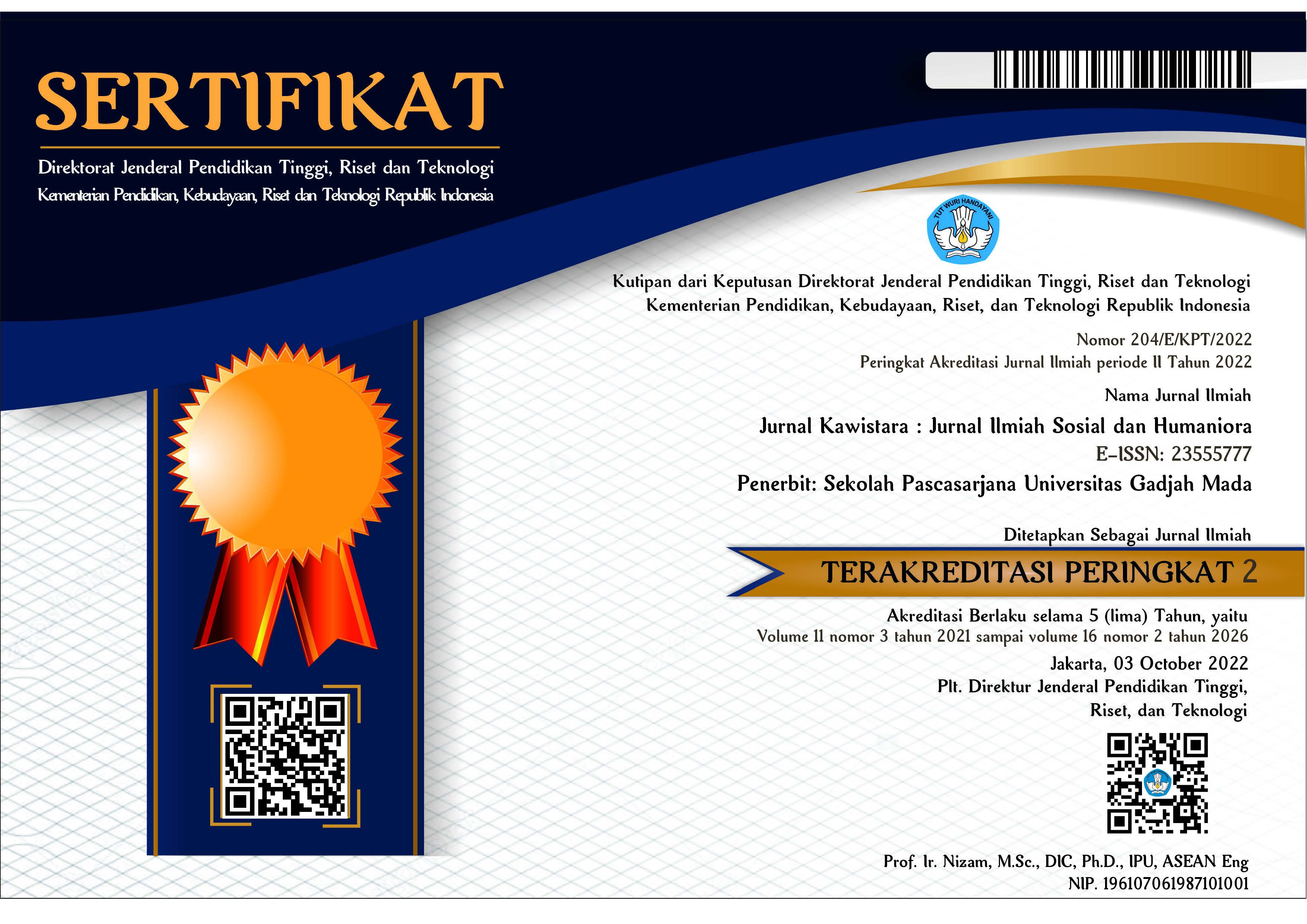POLITISASI LINGKUNGAN OLEH AKTOR PERHUTANI DALAM KASUS KOPERASI TAMBANG INDONESIA III DI KABUPATEN MALANG, JAWA TIMUR
Genta Mahardhika Rozalinna(1*), Lutfi Amiruddin(2)
(1) Universitas Brawijaya
(2) Universitas Brawijaya
(*) Corresponding Author
Abstract
The existence of mining industry namely Koperasi Tambang III (KTI III) in Golo beach, Wojo Village, Gedangan, Malang District, brought negative impact socially and ecologically. Unfortunately, State Forestry Company (Perusahaan Umum Kehutanan Negara/Perum Perhutani) was involved to share their land as location of iron sand mining activity. Perhutani, as a State-Owned Enterprises (Badan Usaha Milik Negara/BUMN), has a contradicting roles at the same time, to manage natural resource of the forest and accumulate profit. The aim of this article is to depict the process of politization of environment done by Perhutani, based on dimensions (daily, episodic, and systemic), scales (local and regional), and power networks (local and regional). Through qualitative method with single instrumental case study approach, we find out that Perhutani has been the subject and object of politization by the bigger economic-political power. On three dimensions (daily, episodic, and systemic), we stated there are two configurations of Perhutani’s roles; first, politizing Golo beach through transform Resort Polisi Hutan (RPH). Second, Golo beach has politized by Malang Government as well as KTI III through transforming the Space Planing (Rencana Tata Ruang Wilayah/RTRW). On the local and regional scale, Perhutani seen by the local community and government, has brought not only the job opportunity, but on contrary the ecological damage. On the local power network, Perhutani was the subject to politize local community and government. However, on the divergent side, it was the object of politization done by KTI III and Malang Government.
Keywords
Full Text:
PDFReferences
Bryant dan Bailey. 2005. Third World Political Ecology. London & New York: Routledge.
Denzin dan Lincoln. 2009. Handbook of Qualitative Research. Yogyakarta: Pustaka Pelajar.
Kr. 2017. Wawancara.
McMichael, H. 2009. The lapindo Mudflow Disaster: Environmental, Infrastructure and Economic impact. Bulletin of Indonesian Economic Studies 45(1): 73-83.
MCW. 2017. Wawancara.
Noor, R., dan L. Ni’am. 2011. Penataan Ruang dan Pengelolaan Sumber Daya. Wacana Jurnal Ilmu Sosial Transformatif, Penataan Ruang dan Pengelolaan Sumberdaya. Edisi 26 Tahun XIII 2011.
Nurhadi, I., dan L. A. Rozalinna. 2015. Struktur Sosial Baru Pasca Kehadiran Perusahaan Tambang (Analisis Strukturasi Pierre Bourdieu Pada Masyarakat Desa Wojo, Kecamatan Gedangan, Kabupaten Malang): Laporan akhir hibah penelitian Fakultas Ilmu Sosial dan Ilmu Politik, Malang: Fakultas Ilmu Sosial dan Ilmu Politik Universitas Brawijaya.
Peraturan Daerah Kabupaten Malang Nomor 3 Tahun 2010 tentang Rencana Tata Ruang Wilayah Kabupaten Malang. 2010.
Peraturan Pemerintah Nomor 72 Tahun 2010 tentang Perusahaan Umum (Perum) Kehutanan Negara. 2010.
Rb. 2017. Wawancara.
(t.thn.). Rencana Induk Penelitian (RIP) Universitas Brawijaya tentang Sasaran Tahap Kedua Tahun 2106-2020 untuk Menuju Daya Saing Regional Asia dan Kawasan Tropik. Malang: Lembaga Penelitian dan Pengabdian Kepada Masyarakat Universitas Brawijaya.
Tim Riset Java Collapse. 2010. Lapindo, Jer Basuki(ku) Mawa Bea(mu). Dalam Java Collapse, dari Kerja Paksa Hingga Lumpur Lapindo. Sleman: Insist dan Walhi.
Yin, R. K. 2013. Studi Kasus Desain & Metode. Jakarta: Raja Grafindo Persada.
Article Metrics
Refbacks
- There are currently no refbacks.
Copyright (c) 2018 Jurnal Kawistara

This work is licensed under a Creative Commons Attribution-ShareAlike 4.0 International License.
Jurnal Kawistara is published by the Graduate School, Universitas Gadjah Mada.







